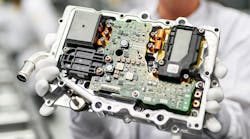Texas Instruments on Tuesday reported sales and profits on the high end of its quarterly forecasts, buoyed by customers building up inventory to protect against delays in supply stemming from the coronavirus outbreak. The chip giant plans to maintain its production as orders slacken, bracing for chip demand to rebound as lockdowns are lifted.
Rich Templeton, Texas Instruments' chief executive officer, said on a conference call that it plans to maintain production at about the same level as the beginning of the year even as customers become more cautious. He said its spending on research and development would remain unchanged. The company also plans to push ahead with billions of dollars of investment in a new analog production plant under construction in Richardson, Texas.
Templeton said it has mostly been business as usual for Texas Instruments despite some unforeseen disruptions to its production and supply lines. He said the company has been rolling out parts to customers with short, stable lead times. Texas Instruments is taking advantage of its vast manufacturing operations to package and test its final components in-house instead of sending them out to contractors in China, Europe, or Southeast Asia.
Texas Instruments said sales slipped 7% to $3.33 billion in the first quarter of 2020, on the high end of its guidance of $3.12 billion to $3.38 billion. Profits dipped slightly from $1.22 billion or $1.26 per share a year ago to $1.17 billion or $1.24 a share. Texas Instruments' core analog semiconductor business slipped by only around 2% over the last year, while chips sold to customers in embedded plunged 18% from a year ago, the company said.
Texas Instruments is one of the largest chip vendors to report quarterly results since the virus led to lockdowns to suffocate the virus, disturbing operations and threatening delays in the global chip supply. Texas Instruments said the economic devastation from the virus mirrors the fallout from the financial crisis more than a decade ago. But the company said it is difficult to anticipate how long the recession could last and how severe it could be.
Electronics manufacturers have been plagued by the prospect of a prolonged fight against the pathogen, which could compound the economic damage and dent demand for phones and other devices. Supply chains have also been tossed into turmoil by the virus, which is causing lockdowns and logistical challenges. "I think customers are still processing what their customers are telling them and we will see that play through," Templeton warned.
Texas Instruments, which tends to report results ahead of other chip manufacturers, said that it widened the range of its revenue forecast to reflect the worsening uncertainty and deepening panic in the population. Profits are projected to be between $0.64 and $1.04 a share in the second quarter of 2020, down from $1.36 a share a year ago. It also predicts revenue in the range of $2.61 billion to $3.19 billion, dipping from $3.67 billion a year ago.
Shares of Texas Instruments are up more than 4% to $112.40 since the announcement.
Texas Instruments is the world's largest vendor of analog semiconductors, which are among the building blocks of every electronic device, ranging from smartphones and cars to data centers and dishwashers. The company sells around 80,000 parts to more than 100,000 customers, the longest list of customers in the industry. It serves as a barometer for the global chip business and a bellwether for demand in the vast electronics industry.
Executives said it is seeing short-term demand from customers stocking up on inventory to prepare for potential shipment delays or long lead times due to the coronavirus crisis. Texas Instruments said the increase in orders diminished in March and that it anticipated orders of its products to continue to decline in April and May. Templeton said he believes customers started to “overcorrect” in the short term as uncertainty looms over the sector.
Texas Instruments said the sales of chips used in cars declined in the mid-single digits and decelerated last month as customers eased production and demand cratered. Sales to the smartphones industry dipped in the double digits. The demand for chips used in personal computers surged as more businesses resorted to remote work. Sales of analog and other chips used in data centers also soared as the use of cloud computing jumped.
Texas Instruments also plans continue to return profits to shareholders as the outbreak of the virus tears throughout the global economy. The company said it rolled out $1.64 billion in share buybacks and granted $841 million in dividends to investors in the first quarter of 2020. "Our objective when it comes to cash return is to return all our free cash flow to the owners of the company," said Rafael Lizardi, chief financial officer at Texas Instruments.
Maintaining the output from its production plants will likely result in a buildup of inventory as customers cancel or pause orders. But the company hopes that having more inventory on hand will better position it to handle a rebound in demand once lockdowns are lifted or loosened. Texas Instruments said it could afford to take these measures because most of its products have long shelf lives, with some chips in production for more than a decade.
"These parts are not going to go bad," said Lizardi. He added that Texas Instruments currently holds $2 billion in total inventory compared to $2.13 billion a year ago.
